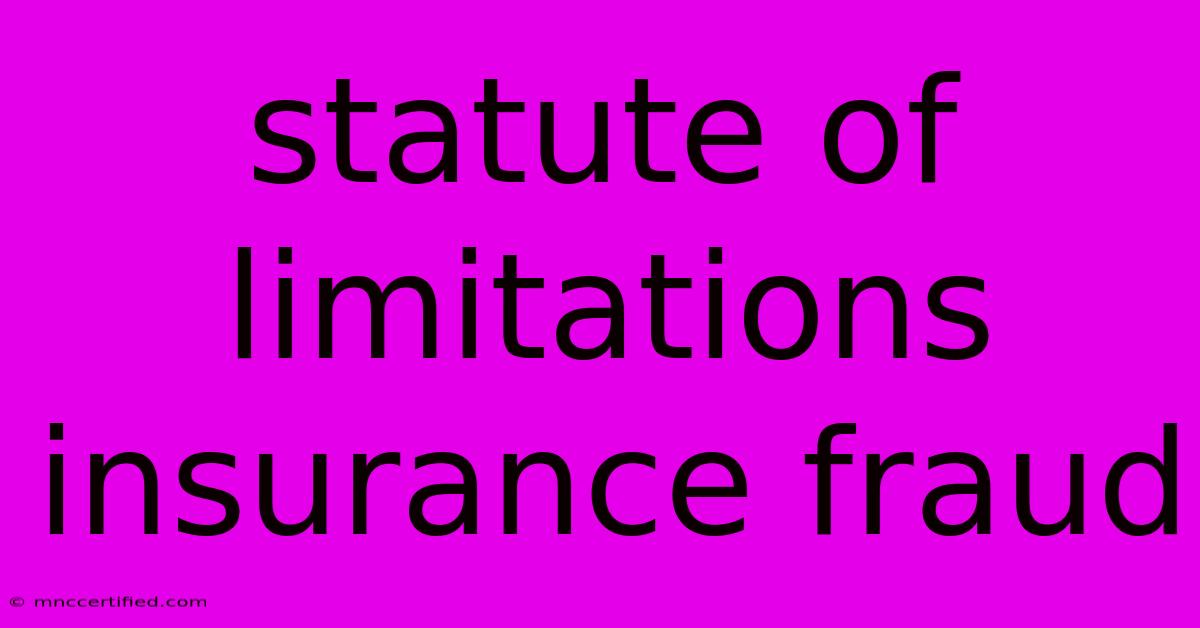Statute Of Limitations Insurance Fraud

Table of Contents
Statute of Limitations for Insurance Fraud: What You Need to Know
Insurance fraud is a serious crime that can have devastating consequences for individuals and businesses. It's crucial to understand the statute of limitations for insurance fraud, which defines the time limit within which legal action can be taken. This article will delve into the nuances of the statute of limitations related to insurance fraud, covering:
- What is insurance fraud?
- Key types of insurance fraud
- Factors influencing the statute of limitations
- How the statute of limitations works in practice
- Resources for reporting insurance fraud
What is Insurance Fraud?
Insurance fraud encompasses any deceptive act intended to gain an unfair advantage in an insurance claim. It can involve manipulating or falsifying information to inflate a claim, staging an accident, or intentionally causing damage to property.
Key Types of Insurance Fraud
Insurance fraud can manifest in various forms, including:
- Auto insurance fraud: Fabricating accidents, exaggerating injuries, or staging vehicle theft.
- Health insurance fraud: Submitting false medical claims, billing for services not rendered, or using stolen identities.
- Property insurance fraud: Arson, faking damage, or filing fraudulent claims for stolen goods.
- Life insurance fraud: Misrepresenting health conditions to obtain a policy or manipulating death benefits.
Factors Influencing the Statute of Limitations for Insurance Fraud
The statute of limitations for insurance fraud can vary depending on several factors:
- Type of fraud: Different types of insurance fraud may have different time limits.
- Jurisdiction: State laws governing insurance fraud vary considerably.
- Whether it's a civil or criminal case: Civil claims may have different deadlines compared to criminal prosecutions.
How the Statute of Limitations Works in Practice
Here's a breakdown of how the statute of limitations typically functions:
- Starting point: The clock usually starts ticking from the date the fraud is discovered, or when a reasonable person should have discovered it.
- Time limits: The statute of limitations for insurance fraud can range from one to ten years, depending on the jurisdiction and specific circumstances.
- Consequences of missing the deadline: Failing to file a claim within the statute of limitations could result in the claim being barred forever.
Resources for Reporting Insurance Fraud
If you suspect insurance fraud, it's essential to report it promptly. You can contact:
- Your state insurance department: They have dedicated fraud investigation units.
- The National Insurance Crime Bureau (NICB): A non-profit organization committed to combatting insurance fraud.
- Local law enforcement: They can investigate criminal activities related to insurance fraud.
Understanding the Statute of Limitations: A Crucial Step
Knowing the statute of limitations for insurance fraud is crucial for both individuals and businesses. By understanding the legal framework surrounding these crimes, you can:
- Protect your rights: Filing claims within the proper timeframe ensures you can pursue legal recourse.
- Prevent fraud: Being aware of the consequences can deter individuals from engaging in fraudulent activities.
- Support justice: Reporting suspected fraud helps bring perpetrators to justice.
Note: This article is intended to provide general information only and does not constitute legal advice. You should consult with a qualified attorney for legal guidance specific to your situation.

Thank you for visiting our website wich cover about Statute Of Limitations Insurance Fraud. We hope the information provided has been useful to you. Feel free to contact us if you have any questions or need further assistance. See you next time and dont miss to bookmark.
Featured Posts
-
Box Office Paddington In Peru Leads Uk Ireland
Nov 09, 2024
-
Heretic Ending What Did It Mean
Nov 09, 2024
-
Insurance Continuing Education Webinars
Nov 09, 2024
-
Mitsui Sumitomo Insurance Phone Number
Nov 09, 2024
-
D4921 Dental Code Covered By Insurance
Nov 09, 2024